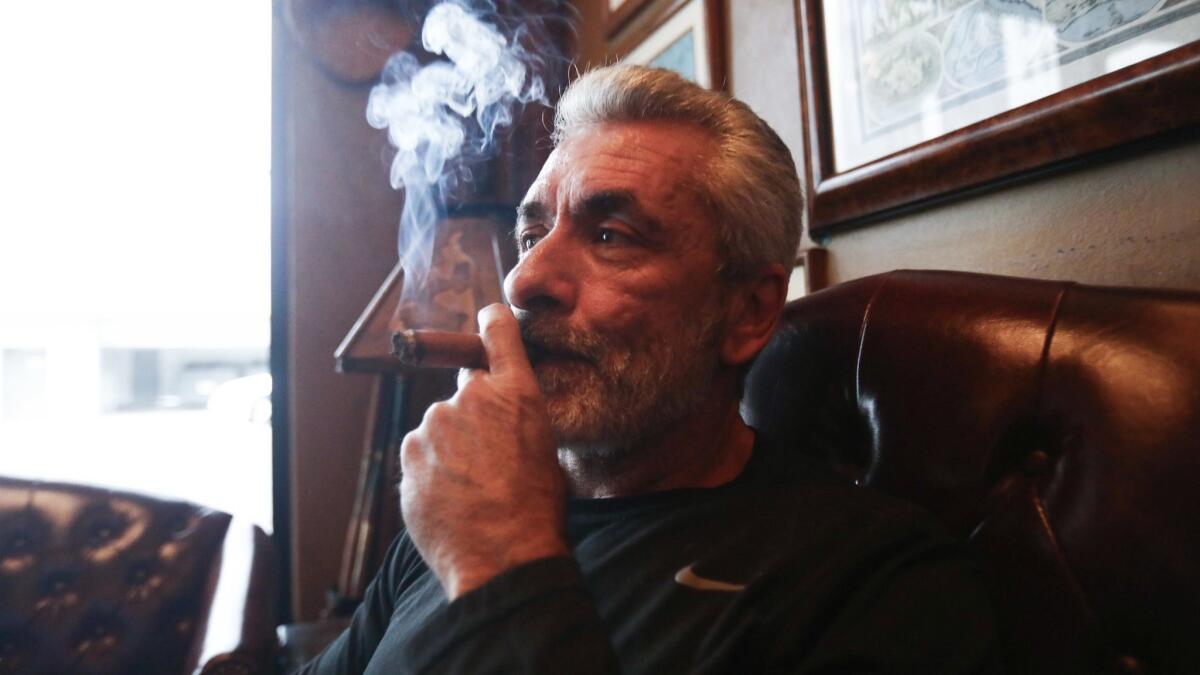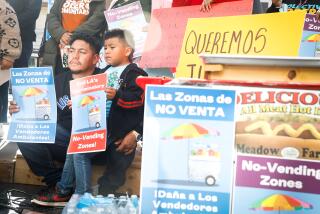Beverly Hills becomes the first U.S. city to end most tobacco sales

Beverly Hills has passed what experts say is the most restrictive tobacco ban in the nation, barring the sale of virtually all nicotine products and setting the stage for similar laws in other cities.
“They’ve set the bar pretty high for us and any city to follow,” said Mayor Pro Tem Richard Montgomery of Manhattan Beach, which is studying its own ban. “We’re encouraged by our colleagues in Beverly Hills taking this courageous step forward.”
The ban, which takes effect in 2021, drew headlines for its extreme stringency, as well as for carve-outs to allow cigar lounges to continue to ply their trade in the tony enclave.
Under the final version of the ordinance, approved Tuesday night by the Beverly Hills City Council, gas stations and convenience stores will be forbidden to sell cigarettes, chewing tobacco and e-cigarettes, while hotels will retain the right to sell them — but only through room service.
“We’ve been watching with bated breath,” said Chris Bostic, policy director at Action Smoking and Health and an early adviser on the rule. “I think that [City Council members] were fully aware when they were voting that they were making history.”
That’s because where Beverly Hills leads, others have followed, experts said.
“Other communities have wanted to do this in the past, but have backed off because the tobacco industry organized major opposition,” said Ruth Malone, a tobacco policy expert at UC San Francisco. “The FDA can’t ban cigarettes. The only ones who can do it are state and local jurisdictions.”
It is already illegal to smoke almost everywhere in Beverly Hills, including in apartment buildings, in parks and while standing on the sidewalk. The city was the first municipality to ban smoking in restaurants in 1987 and has spent decades tightening limits around tobacco.
Tuesday’s ban once again puts it at the vanguard.
“Beverly Hills is more aggressive than almost any other city around, so they’re leading the way,” said Dr. Richard Shemin, chairman of cardiac surgery at UCLA, who was among hundreds who fought for the cigar club exception. “In the end they took a very responsible approach to it and tried to find the right balance.”
After months of debate, the City Council passed the first reading of the ordinance unanimously on May 21. The second sailed through in similarly understated fashion.
“Yesterday I think they were so excited that all their T’s had been crossed that they just voted it in and everybody clapped and that was it,” said Bostic, who watched the meeting remotely.
California has long been at the forefront of anti-smoking legislation. The state already has one of the lowest rates of smoking in the country, second only to Utah. But recent years have seen a renewed appetite for restrictions.
“There has been a groundswell in California where restricting flavored tobacco is catching on,” said Phillip Gardiner, co-chair of the African American Tobacco Control Leadership Council. In both Beverly Hills and Manhattan Beach, such flavor bans immediately preceded the push to ban all sales of tobacco.
But, like many California municipalities that have passed them, Manhattan Beach exempted mentholated products from its recent flavored-tobacco restrictions.
“Part of the opposition’s argument is this is a ‘black cigarette’ and by targeting it you’re discriminating against black people,” Gardiner said. “But let’s be fair, it’s the tobacco industry that pushed these down our throats.”
For some, he said, a total ban may be easier to pass.
“It’s a fast moving front,” said Malone, the UCSF researcher. “We haven’t seen this kind of energy on tobacco for quite a while.”
Bostic said he expects to see the rule challenged by tobacco companies, but that Beverly Hills “is on such solid ground” that other municipalities are likely to follow.
“In certain places, we’ve driven down tobacco use prevalence enough that, politically, we can think about what do we need to do from here to get to zero,” Bostic said. “For a long time it was debated on a philosophical level, but in the last two years folks have tried to make it happen.”
More to Read
Start your day right
Sign up for Essential California for news, features and recommendations from the L.A. Times and beyond in your inbox six days a week.
You may occasionally receive promotional content from the Los Angeles Times.







